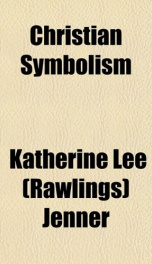christian symbolism

Purchase of this book includes free trial access to www.million-books.com where you can read more than a million books for free. This is an OCR edition with typos. Excerpt from book: CHRISTIAN SYMBOLISM CHAPTER I SACRAMENTS AND SACRAMENTALS THE most important part of the symbolical teaching- of the Christian Church is to be found in the principles which underlie all those religious ordinances of which the more important are known as sacraments and those of less importance as sacramentals. It is the object of this preliminary chapter to describe, not indeed exhaustively, for that could not be done in the space, the general ideas and meanings of the various members of these two classes, with the object of clearing the ground for the artistic application of symbolism by an explanation of the most symbolical part of Christianity. The line between the two classes was originally a rather vague one, and by the earliest writers things are called "sacraments" which are now called "sacramentals," but long ago the Church, both in the East and the West, settled down into confining the name "sacrament" or "mystery" to seven principal ordinances, which differ from the others in producing effects ex opere operato rather than subjectively. . '. : f-":- ,." .... ..., . -SACRAMENTS -"; tA-SaCramenT; -" an outward sign of inward grace, ordained by Jesus Christ, by which grace is given to our souls." Thus defines the "Catechism of Christian Doctrine," in words which differ in nothing essential from the answer to " What meanest thou by this word Sacrament?" in the Catechism of the Church of England. The latter goes on to say that there are two parts in a sacrament, "the outward and visible sign and the inward and spiritual grace." These two parts, with the necessary proviso of a valid minister and a capable recipient, are the essentials, and it is to the "outward and visible sign" that the symbolism applies. The outward sign is common to all sacraments, but it ma...
Info about the book
Author:
Series:
Unknown
ISBN:
1844848272
Rating:
3.5/5 (4)Your rating:
0/5
Languge:
English
Users who have this book
Users who want this book
What readers are saying
What do you think? Write your own comment on this book!
write a commentif you like christian symbolism try:
Other books by this author
Do you want to exchange books? It’s EASY!
Get registered and find other users who want to give their favourite books to good hands!

